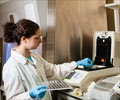The genetic testing of saliva samples identifies the COVID-19 virus more quickly than nasal swab testing in the patients who are infected by COVID-19.

‘The genetic testing of saliva samples identifies the COVID-19 virus more quickly than nasal swab testing.’





At the onset of the COVID-19 pandemic, the urgent need to increase testing was triggered by a shortage of materials, especially nasal swabs, which was a standard method for collecting samples for testing. So the genetic testings were used to overcome these.To identify those infected with COVID-19, researchers began conducting weekly tests of saliva samples from healthy community volunteers in May 2020 and continued for the next 2 years. Among the asymptomatic volunteers who tested positive, Milton and his colleagues found that patients usually showed symptoms after a day or 2 days.
But in genetic testing, it gave slightly quicker results. “That made us wonder whether saliva was better for catching pre-symptomatic patients than the traditional nasal swabs,” he said.
The researchers used data from a subsequent study of people who were in close contact of COVID-19 patients to answer that question. In the study, “We collected saliva and mid-turbinate (nasal) swab samples from contacts every 2 or 3 days during their quarantine period,” said Milton. “All samples were tested using real-time reverse transcription polymerase chain reaction (RT-PCR) to detect SARS-CoV-2 and measure how much viral RNA was in the samples. We then analyzed how these results changed in the days before and after symptom onset.”
“Early in the course of infection, saliva was significantly more sensitive than mid-turbinate nasal swabs,” notably so before onset of symptoms, according to the study, which noted that previous studies had shown that pre-symptomatic transmission plays a greater role than symptomatic transmission of COVID-19.
Advertisement
“Our research supports the use of saliva in large-scale screening in schools and workplaces, as a means of improving screening rates, as well as early detection,” said Milton. “We expect that if rapid saliva tests become available, they could be a major advance from the current nasal swab-based rapid tests.”
Advertisement











